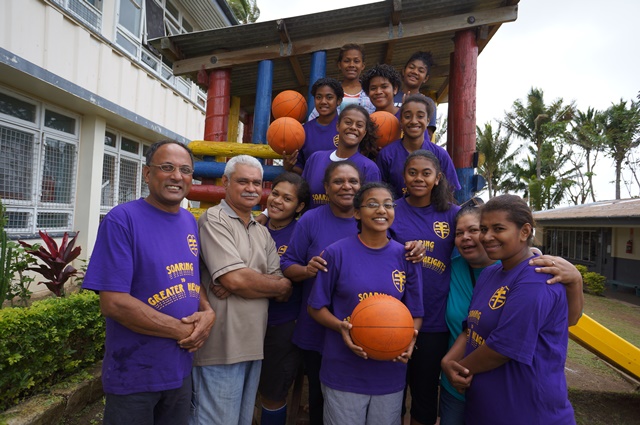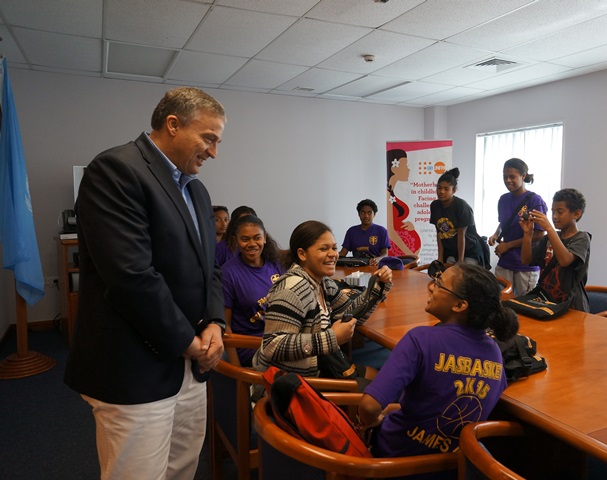AS an all-girls school from the Western Division, Jasper Williams High School ended the Fiji secondary schools basketball competition last week quite satisfied with an all-star selection, just two years in national competition.
The school was also a trailblazer in their own right fielding the only Fijian girls of Indian descent in the competition; the tallest girl in the team, Natasha Narayan, and the feisty Deepika Prakash.

Deepika, 17, has always been interested in sports and even has an arty streak in her, but as a pure science student, striking a balance between her interests and academia is an underlying imperative to satisfy her parent's one request - school is priority.
Deepika has her eyes firmly fixed on becoming a medical practitioner or something related to the field of medicine.
"I am always grateful that I was selected to be trained and have now made it to the secondary school games for the second time but I have had to learn to strike a balance between my interest in sport and academia," the all-rounder said.
"Sports and being able to play in a team keeps me fit and is key to having a life balance with academia but also boosts my morale, sometimes when I have some things weighing on my mind, shooting some hoops just helps me think things through."
Though an extracurricular activity, office technology teacher Lyndal Ligabalavu preferred to teach it as a qualified referee of her home country of Papua New Guinea. Mrs Ligabalavu attributes the overall success of the school's outing to the enthusiasm and determination of the girls and a strong support system she has found in PEMAC teacher Virisila Biudai, school administrator Charles Pickering and the team cooks Helen Garisau and Deepika's father Prakash Madhur.
The struggle is real for the team which has to practise on an external court.
"The girls pitch in when they want to but mostly I just pay for the $7 per hour charge. Nurturing the girls' interest is paramount and basketball offers opportunities for further studies," said Mrs Ligabalavu, who met her iTaukei husband at the Pacific Adventist University in PNG.
"Why do I do it? It is one of my life's passions, I love this sport and developing the three teams (under 15, 17 and 19) has been so good for all of us and the enthusiasm of the girls makes it easy.
"However as a boarding school, most of the girls go home to be with their families, it is difficult to get them to come to a national tournament during the second week of their school holidays so we usually don't have our full teams.
"But it has been a good year and we thank the parents who continue to support us and their daughters, and the school, and especially the core team who give up their holidays to be part of the Jasper team."
Mr Madhur, Deepika's father, says seeing this interest in his daughter was not surprising as sports has been "part of the family" though his support is not without caveat, he emphasises the importance of education.
"It does not make sense to me when parents do not support their children's interests. Sports is a very important component of our lives and it very much contributes to our children's academic performance as well," Mr Madhur said.
The United Nations Population Fund Sub-Regional Office was privileged to host visits from students of two of the three all-girls secondary boarding schools in Fiji - from Adi Cakobau School and JWHS.
UNFPA Pacific director and representative Dr Laurent Zessler sat with the girls, discussing the work that UNFPA does globally and regionally. Dr Laurent shared the critical importance of age-appropriate family life education considering the adolescent fertility rate in most Pacific island countries are still well above the Asia and Pacific region average of 40 live births per year among 1000 girls aged between 15 and 19.
While adolescent (teenagers) fertility rates have declined for most Pacific countries, rates continue to be well over 50 for some in 2013. Fiji is reportedly at 42 live births per year among 1000 girls aged between 15 and 19; for the same year, the rate for France is at six, Australia 11 and New Zealand 24.
Dr Laurent emphasised the particularly high rates of adolescent pregnancy and how such situations more often than not curtail girls realising their full potential - in education, professionally-speaking and in terms of their future.
"It has been both refreshing and encouraging meeting students this week. It is important for all persons to have an education but the girls in whatever field they are pursuing affirmed for me that parents are prioritising education for their daughters too," Dr Zessler said.
"However at the same time we must continue the discussions on issues that young people are grappling with, and like adolescent pregnancies most of these issues are socially and culturally-sensitive but we need to have these conversations.
"Equally important is supporting youth involved in sports. For us at UNFPA, sport is a high-impact development tool in humanitarian and development efforts because apart from higher athleticism and employment opportunities, sports teach us principles of respect, fairness, co-operation, it is about rules and discipline."
For Deepika, training will have to be shelved for a while as she prepares for the Year 12 external examination but outside the classroom her aspirations revolve around the basket, at least for now. "Even if I can't reach a higher level of playing, I would still very much like to be at least an official," she ends with a smile.
For our young people, to be supported is perhaps key. Trusting them in their interests may well motivate them to aim higher, inculcating a way of life that strives for excellence, unwittingly planning for positive outcomes that will require discipline and perseverance.
The ball is in our court.


